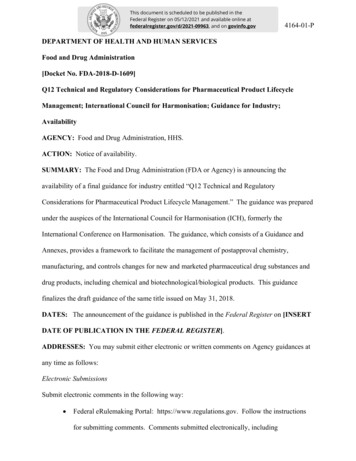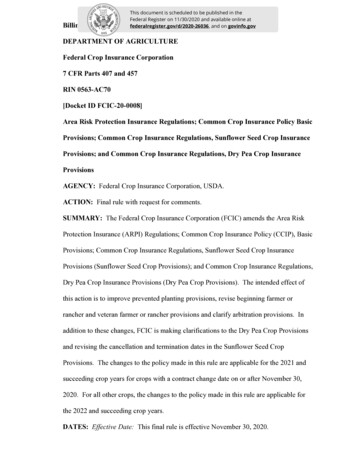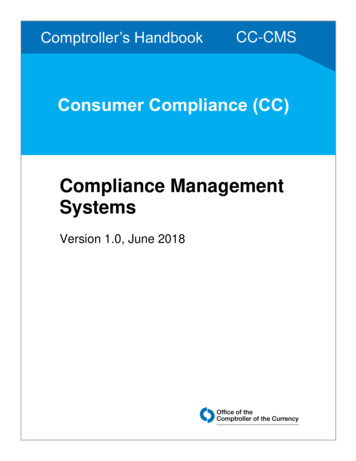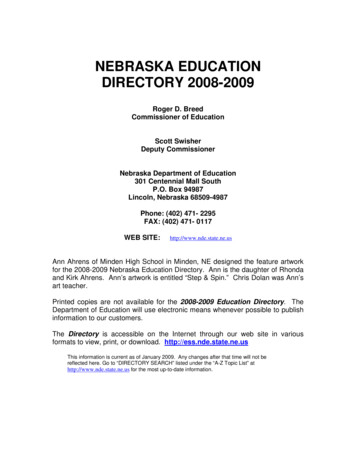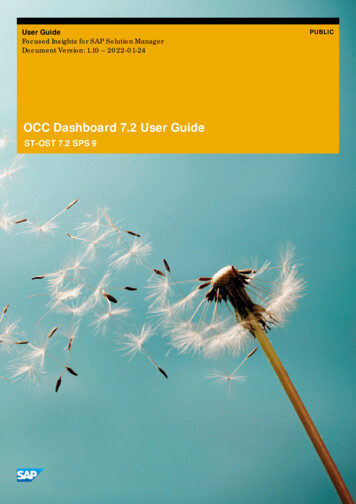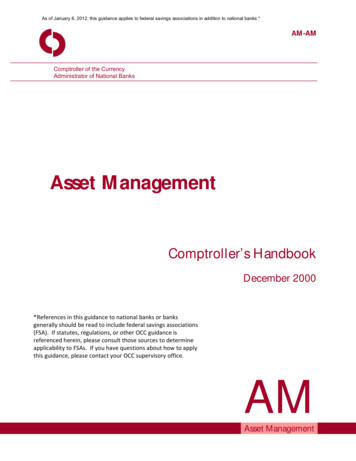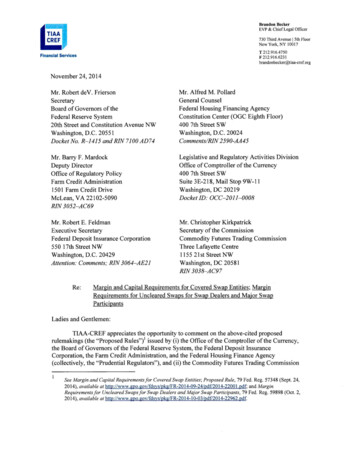
Transcription
Brandon BeckerEVP & Chief Legal OfficerA1 TIAA730 Third Avenue 5th FloorNew York, NY 10017CREFrT 212.916.4750F 212.916.6231brandonbecker@tiaa-cref. orgFinancial ServicesNovember 24, 2014Mr. Robert deV. FriersonSecretaryBoard of Governors of theFederal Reserve System20th Street and Constitution Avenue NWWashington, D.C. 20551Docket No. R-1415 and RIN 7100 AD74Mr. Alfred M. PollardGeneral CounselFederal Housing Financing AgencyConstitution Center (OGC Eighth Floor)400 7th Street SWWashington, D.C. 20024Comments/RIN 2590-AA45Mr. Barry F. MardockDeputy DirectorOffice of Regulatory PolicyFarm Credit Administration1501 Farm Credit DriveMcLean, VA 22102-5090RIN 3052-AC69Legislative and Regulatory Activities DivisionOffice of Comptroller of the Currency400 7th Street SWSuite 3E-218, Mail Stop 9W-11Washington, DC 20219Docket ID: OCC-2011-0008Mr. Robert E. FeldmanExecutive SecretaryFederal Deposit Insurance Corporation550 17th Street NWWashington, D.C. 20429Attention: Comments; RIN 3064-AE21Mr. Christopher KirkpatrickSecretary of the CommissionCommodity Futures Trading CommissionThree Lafayette Centre1 155 21st Street NWWashington, DC 20581RIN 3038-AC97Re:Margin and Capital Requirements for Covered Swap Entities; MarginRequirements for Uncleared Swaps for Swap Dealers and Major SwapParticipantsLadies and Gentlemen:TIAA-CREF appreciates the opportunity to comment on the above-cited proposedrulemakings (the "Proposed Rules")1 issued by (i) the Office of the Comptroller of the Currency,the Board of Governors of the Federal Reserve System, the Federal Deposit InsuranceCorporation, the Farm Credit Administration, and the Federal Housing Finance Agency(collectively, the "Prudential Regulators"), and (ii) the Commodity Futures Trading CommissionSee Margin and Capital Requirements for Covered Swap Entities', Proposed Rule, 79 Fed. Reg. 57348 (Sept. 24,2014), available at 4-22Q01.pdf: and MarginRequirements for Uncleared Swaps for Swap Dealers and Major Swap Participants, 79 Fed. Reg. 59898 (Oct. 2,2014), available at 4-22962.pdf.
(the "CFTC" and, together with the Prudential Regulators, the "Agencies"), with respect tomargin requirements for uncleared swaps and security-based swaps. The Proposed Rules issuedby the Agencies put forward standards by which certain uncleared swaps and security-basedswaps entered into by registered swap entities (such as swap dealers and security-based swapdealers and major swap participants and major security-based swap participants) would becollateralized. These standards, if designed properly, will promote the appropriate managementof leverage and counterparty risk in the over-the-counter derivatives markets. TIAA-CREFremains highly supportive of the Agencies' efforts in this regard, but submits the comments setforth below to address certain concepts in the Proposed Rules that we believe are not infurtherance of the Agencies' regulatory goals and could impose unwarranted burdens on marketparticipants.I.TIAA-CREF BackgroundTIAA-CREF is a leading provider of retirement and investment services in the academic,research, medical and cultural fields, managing retirement assets on behalf of over four millionindividuals and 15,000 institutions nationwide. TIAA-CREF is an organization comprised ofseveral distinct corporate entities whose overall assets under management or administration total 840 billion as of October 1, 20142.Teachers Insurance and Annuity Association of America ("TIAA") is a life insurancecompany domiciled in the State of New York, which operates on a not-for-profit basis. TIAA is awholly-owned subsidiary of the TIAA Board of Overseers, a special purpose New York not-forprofit corporation. The College Retirement Equities Fund ("CREF") issues variable annuities andis an investment company registered with the Securities and Exchange Commission ("SEC")under the Investment Company Act of 1940 ("ICA").TLAA, through its TIAA Asset Management and TIAA-CREF Asset Managementdivisions, is also the parent of a number of investment advisers ("RIAs") registered with the SECunder the Investment Advisers Act of 1940 ("IAA"). These RIAs manage numerous investmentcompanies ("RICs") registered under the ICA, operating as distinct families of equity and fixedincome mutual and closed-end funds.TIAA-CREF's mission is "to aid and strengthen" the institutions we serve and providefinancial products that best meet their specific needs. Our retirement plans and other productsoffer a range of options to help meet the retirement plan administration obligations of institutionsand the savings goals and income and wealth protection needs of individuals. Through theaforementioned entities (which primarily would be deemed "financial end users" under theProposed Rules), we regularly engage in a variety of investment activities, including the use ofuncleared over-the-counter derivatives. This activity is subject to extensive regulation underThis figure includes assets managed by affiliates of Nuveen Investments, Inc., which TIAA acquired on October1,2014.2
applicable insurance law (in the case of TIAA) and under the ICA (in the case of CREF and otherRICs managed by RIAs affiliated with TIAA).While we welcome the additional safeguards contemplated in the Dodd-Frank WallStreet Reform and Consumer Protection Act (the "DFA") with respect to derivatives, includingmandating margin requirements for certain uncleared over-the-counter derivatives, it is our beliefthat certain aspects of the Proposed Rules may unnecessarily complicate the implementation ofthis policy goal and would be counterproductive to the reduction of risk in the financial system.We offer the comments below in order to assist the Agencies in tailoring their final rulemakingsto achieve their regulatory goals in a manner that is effective but not unduly burdensome formarket participants.II.Summary of CommentsTIAA-CREF generally supports the comments submitted by the American Council ofLife Insurers ("ACLI") and the Investment Company Institute ("ICI"), which describe certainissues in the Proposed Rules that, if not resolved, will increase the costs and potentially impair theability of life insurers and RICs to mitigate those risks in their investment portfolios that cannotbe sufficiently hedged through more liquid cleared swaps. In particular, we agree with ACLI andICI that the Proposed Rules could be improved by closer conformance with the internationalframework developed by the Basel Committee on Banking Supervision and the InternationalOrganization of Securities Commissions3 in the manner and to the extent set forth in the theirsubmissions.While supportive of many of the comments contained in those submissions, weseparately comment in order to express concern with respect to potential inefficiency andnegative impact that could result from certain particular aspects of the Proposed Rules. Amongthese are the following: Prohibiting the use of non-cash collateral for purposes of transferring variationmargin (i) would impose an unnecessary financial burden on institutionalinvestors and registered funds that invest in certain liquid, high-quality fixedincome assets with readily determinable market values, which assets have longbeen used to collateralize derivatives and similar financial transactions, and (ii)could cause potential dislocations in the markets for these assets in times ofmarket stress; The definition of "control" that is proposed to be used for purposes ofdetermining affiliation among entities would unnecessarily complicate (i) thedetermination of the implementation timing of initial margin requirements forSee Margin Requirements for Non-Centrally Cleared Derivatives, Basel Committee on Banking Supervision andBoard of the International Organization of Securities Commissions, September 2013, available athttp://www.bis.org/publ/bcbs261 .pdf (the "International Framework").3
certain financial end users, and (ii) the appropriate allocation of permitted initialmargin thresholds; and The application of the Proposed Rules to pre-effective date transactionscollateralized under the same "eligible master netting agreement" ("EMNA")used to collateralize post-effective date swaps would be an unnecessary andinappropriate extension of the margin standards to transactions for which marketparticipants carefully crafted risk mitigation protections prior to the issuance ofthe final rules.These concerns are further elucidated below.III.The Agencies Should Permit Market Participants to Post High-Quality. ReadilyMarketable Fixed Income Securities as Variation MarginLife insurance companies (such as TLAA) and RICs (such as CREF and the registeredfunds managed by TIAA-affiliated RIAs) have long traded over-the-counter derivatives subject toCredit Support Annexes ("CSAs") that permit the use of a broad range of liquid, high-quality andreadily marketable assets for initial and variation margin purposes. At a minimum, these CSAstypically permit each party to post United States Treasury and agency securities. Many CSAsalso permit each party to post readily marketable, high-grade corporate debt securities, subject tosensible haircuts. The ability to post these forms of collateral gives end users the option ofavoiding (when efficient) the use of bilateral and triparty repurchase ("repo") and securitieslending ("sec lending") agreements to raise cash to use as collateral.The Proposed Rules, however, would prohibit market participants from utilizing suchhigh-quality, non-cash assets as variation margin. This would not reduce risk in the financialsystem. Instead, it may cause end users to borrow against these assets in the repo and sec lendingmarkets to avoid being forced to hold more of their invested capital in cash. The immediateimpact of this requirement, therefore, would be to increase the costs to end users of entering intoderivatives (without reducing overall risk in the financial system), or to reduce returns to retailinvestors by virtue of the cost of repo and sec lending contracts used to raise cash.The potential secondary impacts of this requirement are more worrisome. For instance,the repo and sec lending markets may not be readily available in stressed market conditions. As aresult, end users may be forced to liquidate open derivatives contracts if they are not able orwilling to hold sizeable cash positions against their derivatives positions and cannot raise cash byother means. This could potentially accelerate losses, on the one hand, or reduce the ability ofinstitutional investors to hedge, on the other.Accordingly, we strongly recommend that the Agencies consider permitting marketparticipants to post United States Treasury and agency securities, as well as other high-quality,readily marketable fixed income securities (including corporate debt securities), for variationmargin purposes. This would better align United States standards with those set forth in theInternational Framework. We also observe that the SEC generally permits RICs to internally4
segregate, or "earmark," readily marketable securities for purposes of internally segregatingassets to cover the potential loss associated with derivatives positions.4 Extension of a similarconcept to permitted forms of variation margin would be a reasonable approach.IV.The Agencies Should Revise the Definition of "Control" Used in the Proposed RulesThe Proposed Rules establish implementation timing for initial margin requirements byvirtue of a calculation of the aggregate notional amount of contracts held over a specified timeperiod during the prior year by an entity and its "affiliates." Additionally, the Proposed Rulescontemplate that a financial end user will allocate its permitted initial margin threshold amongitself and certain of its affiliates.5 The definition of "affiliate" that is used for this purpose utilizesthe concept of "control" set forth in the Bank Holding Company Act ("BHCA"), including butnot limited to the ownership of at least 25% of any class of voting securities of another entity.Large institutional investors such as TIAA from time to time enter into joint venture,limited partnership, and similar transactions with third parties, whereby the institutional investormay hold a significant minority interest in a financial enterprise or operating company. In thecase of TIAA, these investments, as with those of other life insurers, are subject to restrictionsand overall limitations set forth under applicable state insurance law. It is not unusual, however,for day-to-day management of the relevant enterprise or company to be controlled by third partyoperators or investment managers with majority control. The use of a BHCA concept of"control," however, could require institutional investors such as TIAA to include the swap andsecurity-based swap activity of certain of these entities to determine the timing of implementationof initial margin requirements, and the allocation of the initial margin threshold available to theinstitutional investor.This requirement could lead to ambiguity and confusion in the market. For instance, inthe event a company such as TIAA holds a 25% interest in a non-financial joint venture (e.g., ajoint venture investing in one or more commercial real estate properties), any hedging activityengaged in by such entity could arguably be aggregated for purposes of determining the overallnotional amount of swap and security-based swap contracts held for purposes of theimplementation of initial margin requirements, even though such entity is not a financial end usersubject to mandated initial margin requirements. At the same time, among financial end usersaffiliated under a 25% ownership standard, disputes could arise over the appropriate allocation ofthe initial margin threshold available to distinct members of the "affiliated" group.The complications and inefficiency created by the use of this definition of "control"likely outweigh the benefits thereof. We recommend that the Agencies consider revising thedefinition of "control" for non-registered market participants to require (i) majority ownership ofSee, e.g., SEC Release No. IC-10666 (Apr. 18, 1979).Positions held by affiliated entities are also used to determine a financial end user's "material swaps exposure"under the Proposed Rules.5
any class of voting shares, (ii) the power to select a majority of board representatives or othermembers of the applicable governing body of the affiliated entity, or (iii) ownership of a majorityof the profits or losses associated with a particular legal entity.V.The Agencies Should Ensure that the Margin Requirements Do Not Apply RetroactivelyThe Proposed Rules would require that registered swap entities apply regulatory marginrequirements to all transactions governed by a particular EMNA under which any post-effectivedate transaction is executed. As a result, market participants would be required to negotiate andexecute a separate and distinct EMN A for post-effective date transactions if they wish to preservethe commercial terms negotiated in their pre-effective date transactions. While we understandthat the Agencies are eager to forestall potential evasion of the final margin rules, we feelstrongly that the current formulation of the Proposed Rules' scope would unreasonably burdencounterparties to existing transactions, depriving market participants of the benefit of the bargainstruck with their dealers under existing CSAs.We have observed that the Financial Stability Board is working with the InternationalSwaps and Derivatives Association ("ISDA") to prepare a market protocol that would allow allmarket participants to adhere to certain universal contractual stay provisions with respect toEMNAs with entities that are (or are affiliated with) G-SIFIs that have entered resolutionproceedings. In our estimation, it would not be difficult for the Agencies to coordinate withISDA to establish a similar protocol that could enable market participants to bifurcate thecollateralization of pre- and post-effective date transactions under a single CSA, in order to betterimplement the final rules relating to swap and security-based swap margin requirements. Westrongly recommend that the Agencies seek such a market-based solution in lieu of anunnecessarily blunt approach such as that contemplated in the Proposed Rules.VI.ConclusionWhen finalized, the margin requirements for uncleared swaps and security-based swapswill be among the most important products of the DFA, as they will help to ensure thatunforeseen and dangerous levels of leverage and credit risk do not build in the financial system.It is important, however, that the Agencies recognize the collateral impacts of this importantwork, and carefully tailor their final rules to expand upon existing industry efforts to mitigaterisk, without undermining them. We remain strongly supportive of the Agencies' work to date,and hope that the foregoing comments, together with those of ACLI and ICI, may assist theAgencies in crafting final rules that will expand upon existing industry efforts to reduce risk in anorganic and effective manner.6
Again, we appreciate the opportunity to comment on the Proposed Rules and would behappy to discuss our views further to assist the Agencies in this endeavor if you would find thathelpful.Brandon BeckerExecutive Vice President andChief Legal Officer7
1 TIAA CREF r Financial Services Brandon Becker EVP & Chief Lega l Office r 730 Third Avenu e 5th Floor New York N, Y 10017 T 212.916.4750 F 212.916.6231 brandonbecker@tiaa-cref. org November 24, 201 4 Mr. Rober deVt . Frierso n Secretary Board of Governors of the Federal Reserv Systee m 20th Stree ant d Constitutio Avenun Ne W



